Can you cut 1 Tonne of carbon pollution out of your life?
Take the challengeThis originally appeared on Zero Waste Chef.
Unless you already do cook everything from scratch, you'll cook more when you decide to cut down on—or eliminate—your waste. That's because you'll cut packaged, processed food from your diet and replace these food-like substances with home-cooked versions.
I can do without a lot of stuff in my life—piles of clothing, cosmetics, the latest gadgets. But I can't do without food. So I cook. Recently, a couple of interviewers have said to me, "Cooking is so much work!" I didn't know how to respond. I don't see a way around cooking, unless you can afford to hire a personal chef. Don't get me started on Blue Apron and the amount of trash companies like it generate. The popularity of meal kits makes me lose faith in humanity.
My Buddhist neighbor best explained the need to cook. She told me that at the monastery she used to live in, she noticed one of the monks cooked every day. She said to him, "You must really like to cook." He responded, "I really like to eat."
If you want to eat tastier food, improve your health, cut down on your waste, reduce your dependency on corporations to feed you, spend more time with your family and save money, then cook real food. I know this all takes time. These tips will help save you some.
Plan ahead
1. Cook simple food
I make a lot of one-pot meals and other simple food—dal, frittata, soup, pizza, roasted vegetables. These types of dishes help you use up food you have on hand so you waste less of it. I don't cook anything very elaborate but it all tastes good.
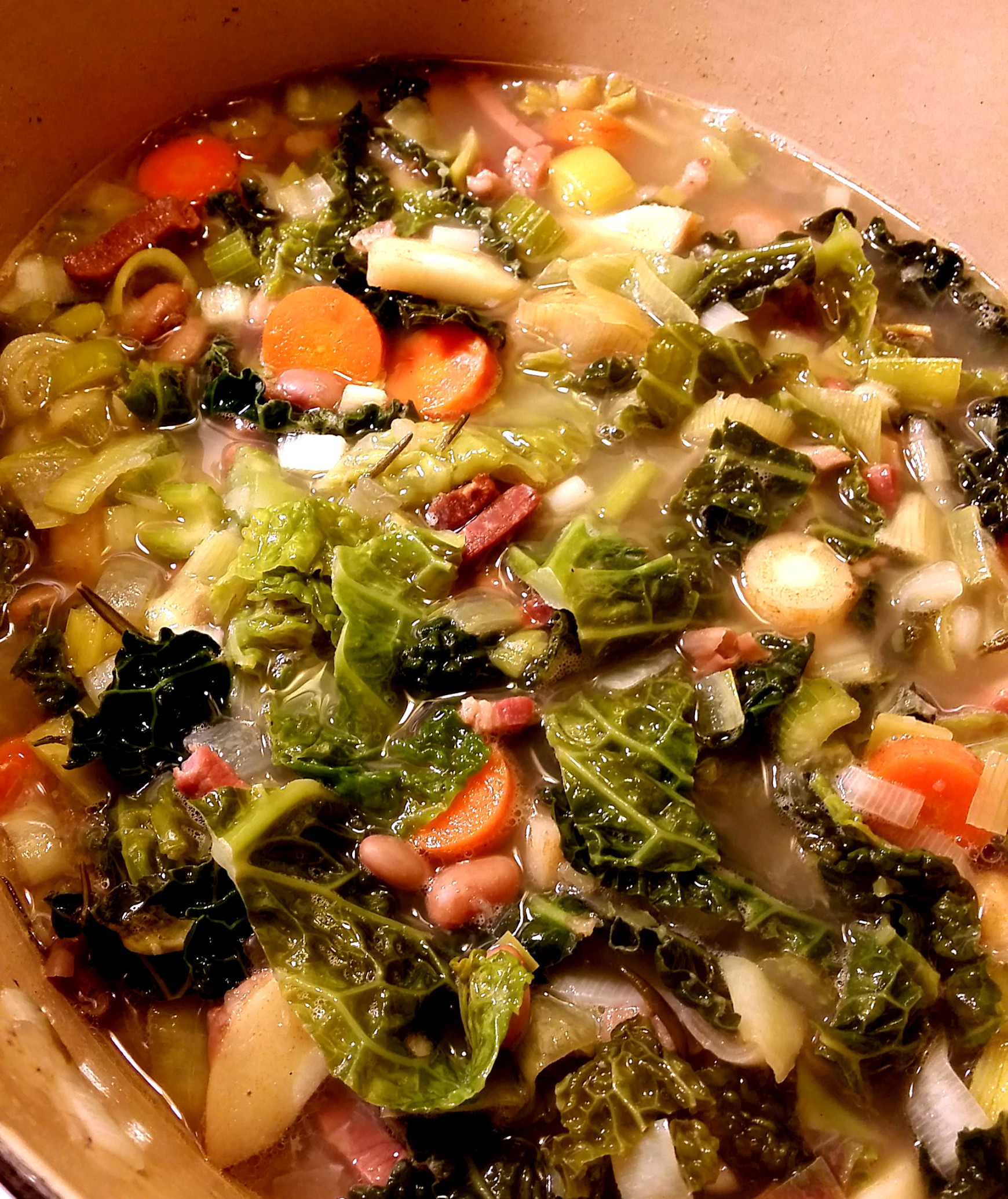
2. Stock up on non-perishable staples when you shop
When I run out of something, I add it to the grocery list I keep on my phone. When I need staples like rice, beans, sugar, salt, baking soda and so on, I buy lots. I hate to realize just as I start cooking that I've run out of an important ingredient.
3. Buy organic produce and don't waste time peeling it
I don't recommend eating the peels of industrial produce (I refuse to call pesticide-laden food "conventional"). Stick with organic, stop peeling potatoes and carrots and save time.
4. Start early
I love to eat steel-cut oats for breakfast. At night before bed, I combine them with water in a pot, bring everything to a boil and then turn off the heat. By morning, they have cooked and I simply heat them up. If I forget to do this, they take about 45 minutes to cook in the morning. I don't have 45 minutes in the morning. Do what you can early and you won't feel so daunted later when you're tired or rushed.
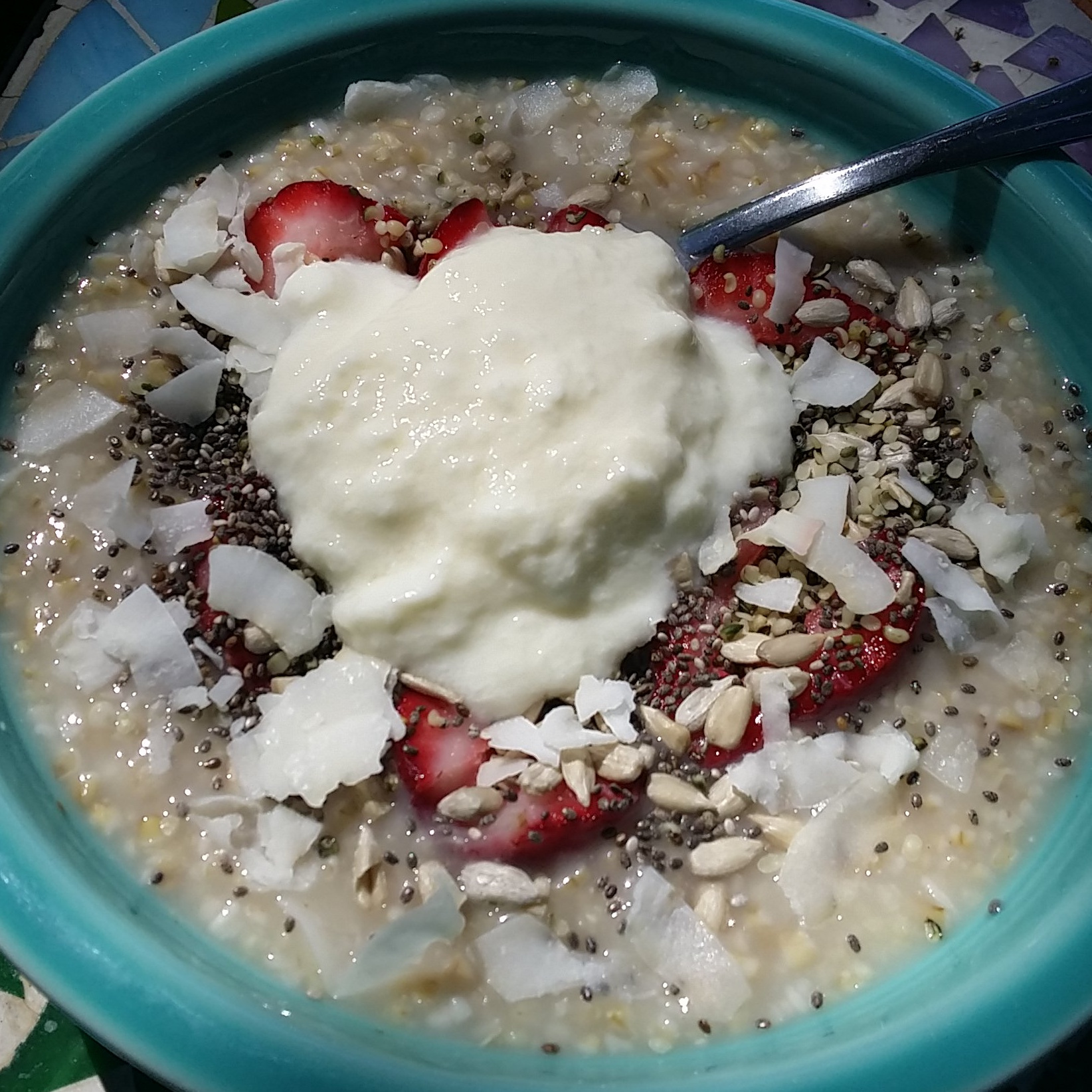
Equipment
5. Keep your knives sharp
Dull knives can slip and cut you. A sharp one will speed up chopping and help keep your digits intact.
6. Use a pressure cooker
Friends and readers kept telling me to get a pressure cooker and am I ever glad I finally did. I love it. I'm actually a bit obsessed with it. I can cook chickpeas in minutes and they taste spectacular. I have to admit that opening a can does take less time but the contents can't compare with beans you cook yourself. You'll save money too. (Read more about my pressure cooker here.)
7. Use a crock pot
I don't cook that much in my crock pot but I do use it regularly for making stock. I have made good minestrone soup in it to. You just toss everything there and let it sit all day.
8. Choose the right tool for the job
For example, if you want to make a vat of soup, use one large pot, not four tiny pots occupying all the burners on your stove. Trying to cook with the wrong tools leads to frustration and inefficiency. I don't own a lot of stuff but I do have a kitchen fully equipped to fit my needs.
At your station
9. Organize a mise en place
This French phrase means "put in place." Before you start to cook, chop and measure out everything and set it out on your countertop. Then just grab what you need as you cook. I find this saves me SO much time.
From the ingredients in my mise en place below, I made balsamic vinaigrette dressing, a cucumber and beet salad with said dressing (I had cooked the beets on the weekend in my pressure cooker), and cauliflower "couscous" with pesto (I had made a large amount of pesto and froze it a couple of weeks before I took this pic).
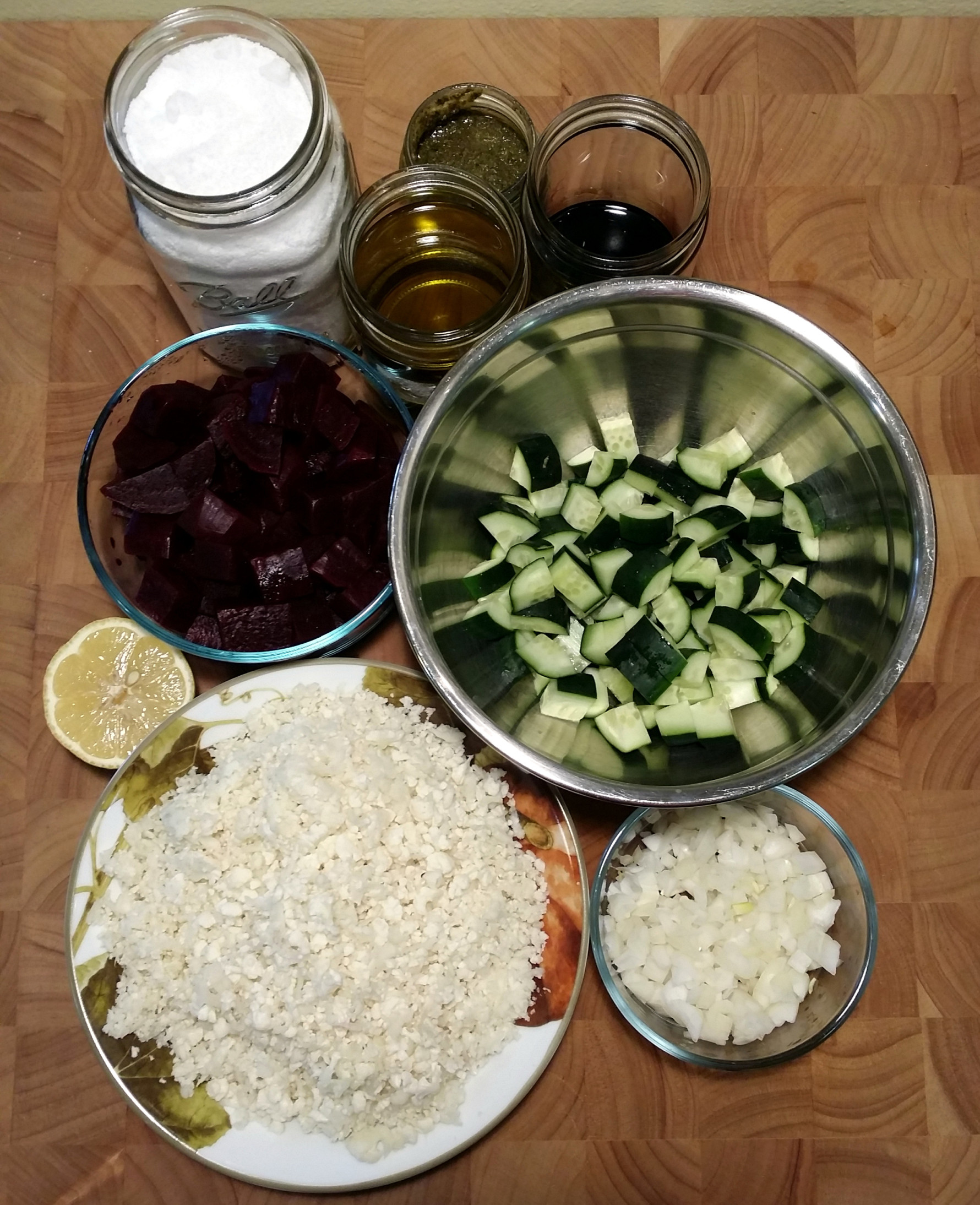
10. Organize your tools
I have a tiny kitchen. You can read a post about it here. One of my favorite accoutrements is the bar in the pic below, which holds all the utensils I constantly use. I don't have to search through drawers or cupboards for these when I need them.
11. Double or triple recipes
Cook a vat of soup and you can eat it all week and freeze some of it for later. Making extra doesn't require much more effort and will save you lots of time in the long run.
12. Prep what you can in advance
My daughter sent me the pic below of garlic she minced and then topped with coconut oil. Mince once, refrigerate and use all week long. Similarly, when I come home from the farmer's market on the weekends, I prep what I can. I clean everything, trim vegetables like carrots and beets, prep fruit like berries and freeze a bunch of them to eat later and get everything somewhat organized for the upcoming week.
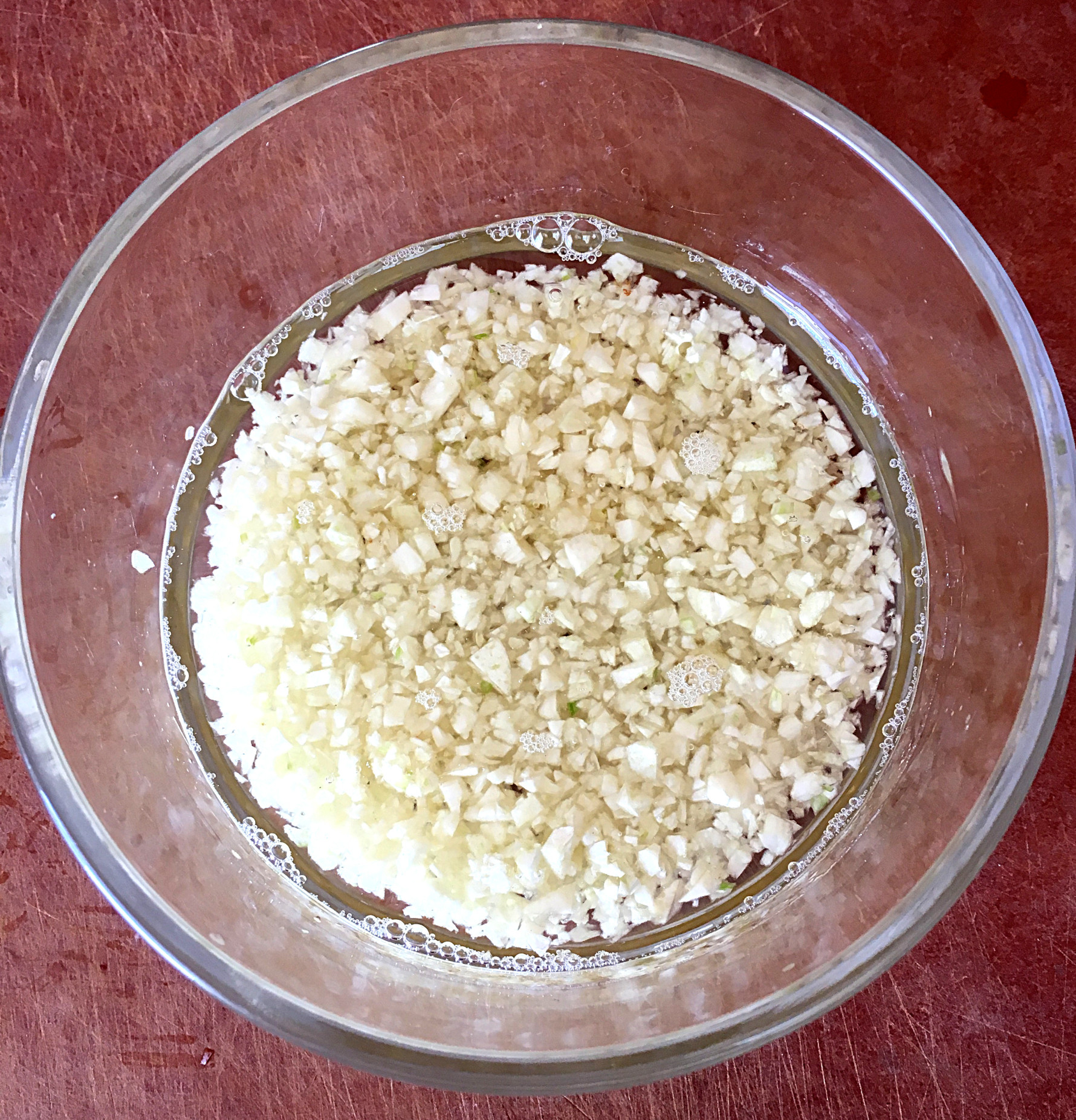
13. Keep your compost bowl close by when prepping
This helps keep your countertop clean and organized. If you don't compost, here's a post on how I compost the lazy way.
14. Heat water up in a kettle while you prep
When I make soup, I sometimes boil water in my kettle and then pour that water in my soup pot. This helps heat everything up faster. I do the same thing with my pressure cooker.
15. Cram more into your oven
If you're making, say, eggplant parmigiana at 350 F, bake a pie or cobbler while you have the oven on.
16. Clean as you go
I am trying to instill this in my kids. Every good chef knows this rule. Clean as you cook and you'll work more efficiently and won't face a sink piled high with dishes when you're done.
Lifestyle tips
17. Get your neighbors and friends involved
Earlier this year, I did a webinar on zero-waste cooking for some students at USC. One of them asked, as busy students, how can they find the time to cook? I suggested that they each take turns making vats of food for the entire group at the beginning of the week. In other words, we can all work together and share! It's a radical idea.
18. Farm out the cooking to your children
Yes, it will take time to teach them but once your kids have learned how to cook, they can cook dinner regularly. I don't buy snack food because I don't buy processed, packaged food. When my younger daughter wanted cookies a while back, I said you can have some but you have to make them. When I woke up the next morning, I found a batch of shortbread cookies on the counter! This is such an important skill—cooking in general, not just baking shortbread, although that is also very important.
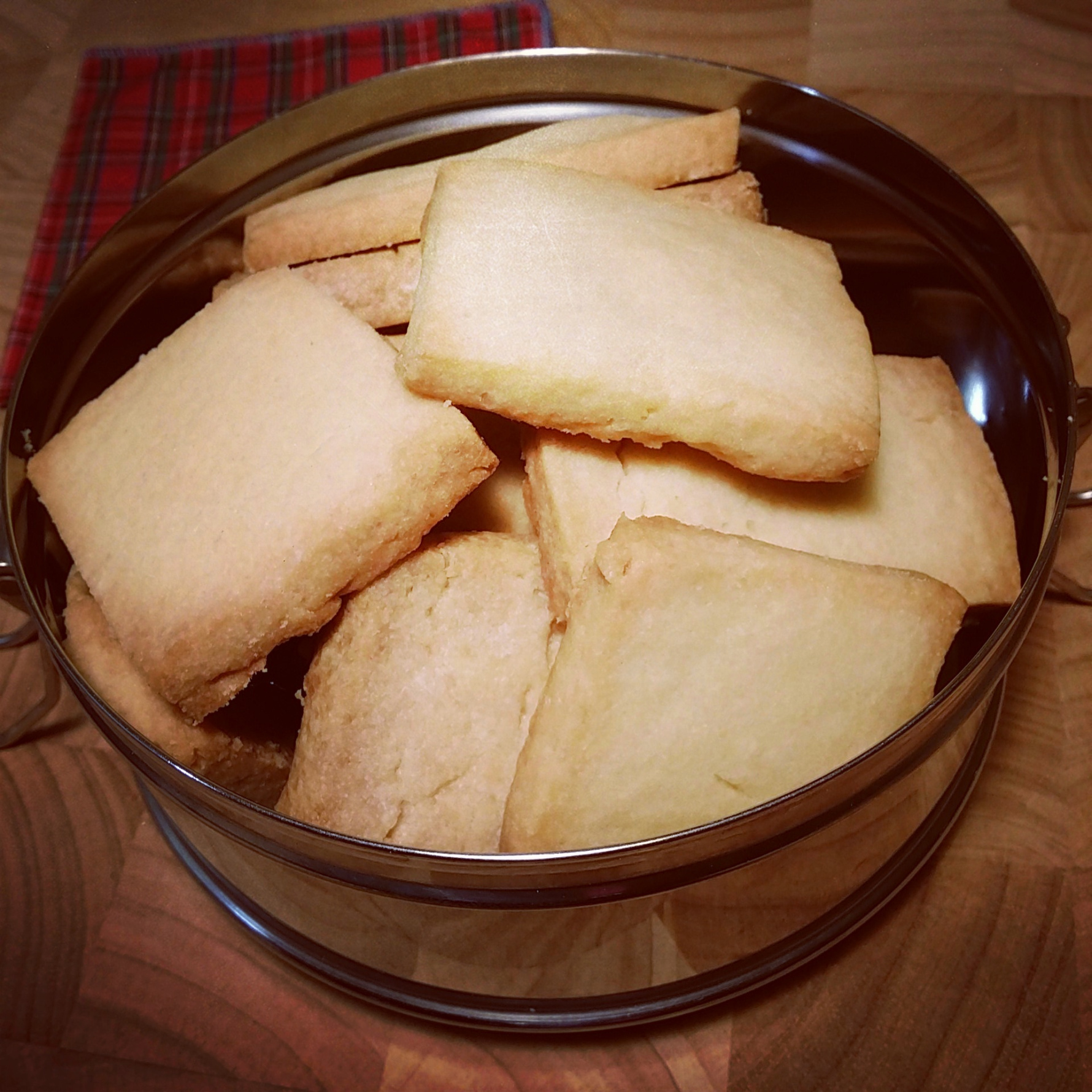
There you have it—18 ideas for saving time in the kitchen.
You may hear people say "I don't have time to cook, so I eat convenience food" but you won't (usually) hear "I don't have time to shower, so I am encrusted in filth" or "I don't have time to do laundry, so I go naked."
Cooking is a necessity. But only if you eat.
